

 |
|||||||||
Dalton chairs Adult and Elder Health Nursing During her 28 years with the UNC School of Nursing, Dalton excelled as a professor, department chair, and pain management 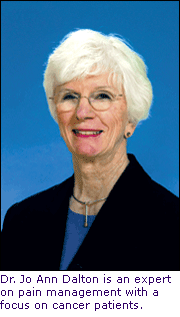 expert. She decided that Emory could provide her with the best of both
worlds, professionally and personally.
expert. She decided that Emory could provide her with the best of both
worlds, professionally and personally. “I saw an opportunity to contribute to the nursing profession and be closer to my family,” Dalton says. “I have always viewed Emory as an exceptional environment for research to benefit patients.” Early in her career, Dalton worked with a hematological oncologist who made her more aware of the difficulties in managing pain for cancer patients. “I saw this as an area where nursing could make a difference,” she says. Eventually, Dalton set up an ambulatory care center and later co-founded the North Carolina Pain Initiative to promote education about pain management. She also studied at the University of Rochester as a Robert Wood Johnson Clinical Nurse Scholar. “I had many mentors there who were very influential in looking at pain as a clinical problem and a scientific endeavor,” recalls Dalton. Most recently, she co-wrote an article on tailoring cognitive behavioral therapy (such as distraction, relaxation, or massage) to the individual for the journal Nursing Clinics of North America. Too often, clinicians believe these therapies work for everyone. “You would never assume that all diabetics need the same type and dose of insulin,” says Dalton. “It’s the same principle with cognitive behavioral therapy. You have to determine which therapy works best for a particular patient. The bottom line is to make the patient comfortable.” Dalton plans to form new research collaborations and support faculty development in the Department of Adult and Elder Health Nursing. “I want to help make the School of Nursing the premier research school and one that continues to be highly regarded in nursing education,” Dalton says. “I’m committed to working with the faculty to learn what their goals are so we can make the school what we want it to be.” |
|||||||||
|
|
Moving Forward |
Connor wins top Georgia honor |
|||||||
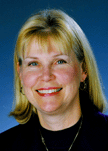 Dr. Marcia McDonnell has been appointed a tenure-track assistant professor in Family and Community Health Nursing. McDonnell is is a family nurse practitioner whose research focus includes women with HIV. She formerly was a clinical-track faculty member. 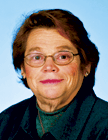 Dr. Sarah Freeman was promoted to clinical professor in Family and Community Health Nursing. She teaches primary care, women’s health, and bioethics and directs the family and the women’s health nurse practitioner programs. Her research focuses on bioethics. 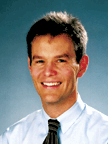 Dr. Michael Neville was promoted to clinical associate professor in Adult and Elder Health Nursing. Neville teaches undergraduates in the integrated science sequence and graduates in advanced pharmacology. He also directs residency programs for the Department of Pharmaceutical Services at Emory Hospitals. 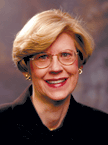 Dr. Anne Bavier recently earned her PhD and now serves on the faculty. Bavier chose to change career tracks in order to pursue research and enhance her work with the Winship Cancer Institute. She also teaches health policy to seniors and graduate students. Bavier previously was assistant dean for strategic planning and external relations. |
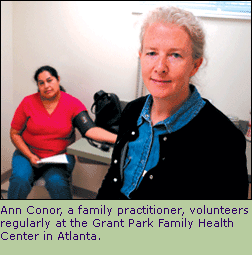
In 1980, Connor helped set up clinics for the homeless, sponsored by the GNA. One of the first nurses to emphasize the need for foot care of the homeless, Connor did more than simply provide health care. She and her husband, A.B. Short, opened Café 458, a restaurant for the homeless offering an array of health and social services. For more than 10 years, Connor and Short invited homeless people they had come to know to live with them. This dedication to others made Connor the natural choice as the 2003 Nurse of the Year for the GNA fifth district and subsequently as the GNA 2003 Nurse of the Year for the state. She shares the statewide honor with Linda Easterly, director of Occupational Health and Wellness at Houston Healthcare in Middle Georgia. “Ann has always gone beyond what a nurse is routinely expected to do and is an outstanding, unassuming advocate for the underserved population,” says Betty Daniels, 51N, 67MN, former president of the GNA’s fifth district in metro Atlanta. |
||||||||
Parker named to Honeycutt Chair |
|||||||||
| Parker holds one of two chairs endowed by the Metropolitan Atlanta Community Foundation in honor of Honeycutt, 39N, one of the first oncology nurses to practice at Emory and in Georgia and the private nurse to Atlanta philanthropist Robert Woodruffand his family. (A search is under way to fill the second chair, designated for an oncology nursing scholar). While Honeycutt developed the art of caring for critically ill patients at the bedside, Parker has pioneered the physiological study of symptoms and chronic disease. In 2001, she established the Center for Research on Symptoms, Symptom Interactions, and Health Outcomes, one of nine US exploratory centers funded by the National Institute of Nursing Research. “This center would not be possible without Kathy’s vision,” says School of Nursing Dean Marla Salmon. “Her contributions to 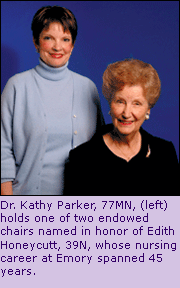 research, clinical practice, and education are
outstanding
and have raised the visibility of the nursing school on many levels. Awarding
the Honeycutt Chair to Kathy is our way of recognizing her special qualities
and paying tribute to Edith for her many contributions to nursing practice
and education.”
research, clinical practice, and education are
outstanding
and have raised the visibility of the nursing school on many levels. Awarding
the Honeycutt Chair to Kathy is our way of recognizing her special qualities
and paying tribute to Edith for her many contributions to nursing practice
and education.”Parker’s interests stem from 20 years of clinical experience, including several years of nephrology practice at the Atlanta Veterans Affairs Medical Center. Although her ongoing research focuses on sleep/wake cycle disturbances in patients on hemo-dialysis, her expertise in sleep disorders has led to collaborations with nursing and medical faculty on sleep studies in other patient populations. She is an associate professor in the Department of Neurology, where she maintains a clinical practice in the Emory Sleep Disorders Center, and is one of five nurses certified in Clinical Sleep Disorders by the American Board of Sleep Medicine. Additionally, Parker has been instrumental in developing programs for master’s and doctoral students in the nursing school and for research ethics education in the university’s Graduate Division of Biological and Biomedical Sciences. She recently served on the President’s Research at Emory Commission and was among the faculty who advised a search committee resulting in the recent appointment of James Wagner as Emory’s 19th president. |
|||||||||
Program prepares new nursing faculty |
|||||||||
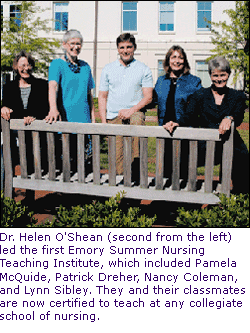 To address the problem, the School of Nursing created the Emory Summer Nursing Teaching Institute, a fast-track program to help master’s-prepared nurses become skilled educators. Nurses take part in workshops, online activities, and teaching practica in order to receive a post-master’s certificate and earn 12 graduate-level academic credits. “This course is a way to begin to address the urgent need for nursing faculty in Georgia,” says Dr. Helen O’Shea, who designed and directs the teaching institute. “At least 20% of faculty in Georgia will retire in the next five years, and there aren’t enough new faculty to take their places. ”Thanks to O’Shea, the 10 nurses who enrolled in the institute now know what it takes to lead a class and make a topic interesting and engaging for all types of students. Valencia Hawthorne likens the experience to ballroom dancing. “Teaching is a series of choreographed steps and moves that have to be learned and come together seamlessly with practice,” says Hawthorne, who directs neuroscience nursing at St. Mary’s Hospital in Athens, Georgia. “You don’t realize how much practice it takes because it looks so smooth and natural.” In the workshop phase, O’Shea covered the essential “ballroom steps”—curriculum development, teaching strategies, student evaluation, use of technology, and the faculty’s role—and had students design a course syllabus. After concluding their teaching practica in the fall, students are now qualified to teach at any collegiate school of nursing. Four of the students joined Emory’s nursing faculty this past year, and a fifth student recently joined the faculty as a result of the institute. “It’s important to know the science of teaching nursing students,” says Gloria Perkins, the newest faculty member and a nurse practitioner in neurosurgery at The Emory Clinic. “I have 23 years of nursing experience to offer. Now I can give back.” Holly Brown, who joined Emory’s nursing faculty last year, feels the same. “We have to fill more faculty nursing roles. It’s up to us to keep the profession going so we can hand over the torch to others who come after us.” |
|||||||||
| MOVING FORWARD |
Beloved nursing educater served 32 years |
||||||||
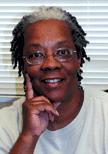 Dr. Jill Hamilton recently was appointed assistant professor in Adult and Elder Health Nursing. She specializes in the study of older African Americans with cancer and how they live in the community. Hamilton just completed a postdoctoral fellowship at Oregon Health & Science University. 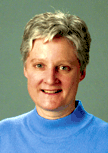 Dr. Martha Rogers, a pediatrician, is a new clinical professor in Family and Community Health Nursing. Rogers serves 50/50 with the Lillian Carter Center for International Nursing and the Task Force for Child Survival and Development, a partner of the LCCIN. Her research includes the impact of HIV/AIDS on children and families, AIDS orphans, and child health and development. 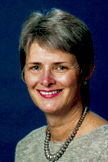 Dr. Lynn Sibley joined the nursing school as academic director of the international health dual-degree major (MSN/MPH) in the Lillian Carter Center for International Nursing and associate clinical professor. A family nurse midwife, Sibley has worked extensively on safe motherhood initiatives in India and Ethiopia. She is a clinical associate professor in Family and Community Health Nursing. 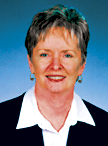 Dr. Joyce Murray began a two-year term this past fall as president of the National League for Nursing. Murray is professor of Adult and Elder Health Nursing and director of the Ethiopia Public Health Training Initiative at The Carter Center. 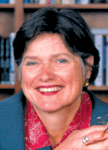
Dr. Marla Salmon received an honorary doctoral degree from the University of Nebraska Medical Center. Salmon is now in her fifth year as dean of the School. |
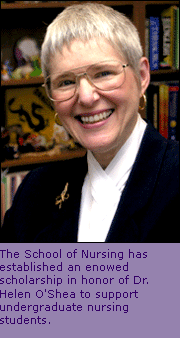 education at Emory, in Georgia, and the nation.
education at Emory, in Georgia, and the nation. Since Dean Ada Fort hired her in 1971, O’Shea has taught more than 2,500 baccalaureate students about the importance and privilege of caring for patients. “We’re losing someone who’s made a difference and been a role model for all of us,” said Dr. Michael Johns, CEO of the Woodruff Health Sciences Center. O’Shea has been a nurse for 45 years. At Emory, she served as assistant dean for the BSN program and as co-director of the Office of Student Affairs. A full professor of nursing since 1986, she was director of the BSN program for many years and chair of the Department of Adult and Elder Health Nursing for the last six years until her retirement. Additionally, O’Shea has been an influential force in nursing education beyond Emory. For 15 years, she was a site visitor for the National League of Nursing and also served on the Council of Baccalaureate and Higher Degree Program Review Board, including two years as chair. In recognition of her leadership, O’Shea received the Mabel Korsell Award from the Georgia League of Nursing in 1996 and was named an honorary member of the Emory Nurses Alumni Association in 2000. Although she stepped down from her full-time duties, O’Shea is teaching part time in the School of Nursing and directing the Emory Summer Nursing Teaching Institute, which she established last year to address the shortage of nursing faculty. The School of Nursing has found an enduring way to express its appreciation for O’Shea. During commencement last May, Dean Marla Salmon presented O’Shea with an honorary BSN degree in addition to her nursing pin. Salmon also announced the creation of the Dr. Helen O’Shea Endowed Scholarship Fund to support one to two nursing undergraduates annually. The school has raised more than $52,000 for the fund to date. O’Shea was overwhelmed by the gesture. When asked how she felt about retirement, she replied, “It’s been a great ride.” Gifts to the Dr. Helen O'Shea Endowed Scholarship Fund may be sent to the Office of Development, Nell Hodgson Woodruff School of Nursing, 1520 Clifton Road NE, Suite 446, Atlanta, Georgia 30322. |
||||||||
Robbins oversees academic administrative services |
|||||||||
Robbins has a wealth of experience from which to draw. While at GSU, she directed admissions for graduate students in 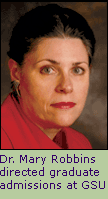 the College of Arts and Sciences, which has 20 academic departments and
37graduate
degree programs. Among other responsibilities, her office staff ensured
that graduating students met all of their degree requirements, managed
the flow of paperwork and computer data, communicated college and university
policy, and oversaw the budget. She also established graduate fellowships
in English, medicinal chemistry, philosophy, and music education.
the College of Arts and Sciences, which has 20 academic departments and
37graduate
degree programs. Among other responsibilities, her office staff ensured
that graduating students met all of their degree requirements, managed
the flow of paperwork and computer data, communicated college and university
policy, and oversaw the budget. She also established graduate fellowships
in English, medicinal chemistry, philosophy, and music education. “What I liked best about that position was the diversity,” Robbins says. “It was like living inside a huge book. I could watch the differing perspectives of philosophers, chemists, and historians. It’s fascinating to see how experts in the various disciplines look at the world.” Comparing her work to a book is an appropriate analogy for Robbins, who studied medieval literature as a doctoral student and taught in the English department at GSU. Her scholarly background has served her well in the people-oriented field of admissions. “A background in literature prepares one to deal with people because one is studying the human character,” she says. At the moment, Robbins is becoming acquainted with the faculty, staff, and students in the School of Nursing. “The students are bright and very motivated,” she says. “They are surely Emory’s best.” |
|||||||||
Grant establishes Hubert Fellowships |
|||||||||
 students interested in international health and broaden the school’s
efforts to improve health services for vulnerable people worldwide.
students interested in international health and broaden the school’s
efforts to improve health services for vulnerable people worldwide.Awarded annually, the Hubert fellowships are administered by the Lillian Carter Center for International Nursing. Hubert Fellows participate in service learning opportunities with faith-based organizations in countries where the center works. Currently, the center offers a variety of experiences for students, such as academic exchange programs in South Korea and Canada and research projects in Kenya and the Caribbean to address nursing workforce issues. Undergraduate and graduate students are eligible to become fellows, the first of whom traveled to Jamaica, the Bahamas, and the British Virgin Islands this spring. Their fellowships are made possible by the generosity of the late O.C. Hubert, who owned extensive real estate throughout Cobb County, Georgia. Prior to his death in 1986, Hubert directed that most of his estate be used to improve health and nutrition for the world’s people. |
|||||||||
Elizabeth Wood Agnor, 31 N |
|||||||||
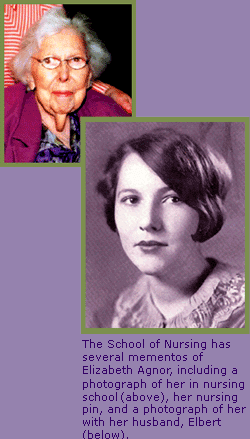
Two nursing alumni who died last year seemingly had nothing in common. One lived almost a century and saw the university and the nursing school go through tremendous changes from the 1930s into the 21st century. The other died from a debilitating illness in his late 40s. Yet both exemplified the essence of caring and strong family ties to Emory. While in nursing school, Elizabeth married Elbert Agnor, 31C, 35M, during his first year of medical school. Their bond with Emory would grow even stronger. Elbert’s brother, William Agnor, was a law professor at Emory for 30 years. Both of their children, Ellen 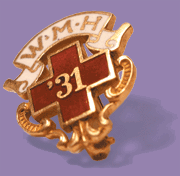 Agnor Bailey, 63C, 87MBA, and Richard Wood Agnor, 56B, 62MBA, graduated
from their alma mater.
Agnor Bailey, 63C, 87MBA, and Richard Wood Agnor, 56B, 62MBA, graduated
from their alma mater.“Mother was a homemaker while she raised us,” says Ellen, “but when I entered college, she started working with father (an internist) as his office nurse and manager. She worked with him for more than 20 years, into the early 1980s, when they retired.” The Agnors were an inseparable team. “Theirs was a true partnership, both at home and in the office,” Ellen adds. “They worked as a team to treat their patients, each contributing their own expertise.” After Elbert Agnor died in 1993, Elizabeth moved into Budd Terrace, the residential facility at Wesley Woods. Her children, 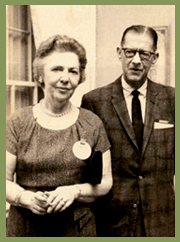 grandchildren, and great-grandchildren visited her there until she died
on June 6, 2003, at age 94.
grandchildren, and great-grandchildren visited her there until she died
on June 6, 2003, at age 94.Despite their passing, the Agnors’ ties to Emory flourish. Ellen Bailey is the COO of Cardiology of Georgia, PC, a group practice of about 30 cardiologists located in medical centers and hospitals in and around Atlanta. She also serves on Emory’s Board of Trustees, a commitment she plans to continue for several years. “Most of my family have either worked in medicine or in education,” she says. “That’s just what we do. I guess that’s why Emory has been such a good fit.” When the new School of Nursing building was dedicated in 2001, Ellen made a pledge on behalf of her mother. A plaque outside the Alumni Auditorium bears Elizabeth Agnor’s name, along with other Nurses Alumni Association members who helped fund the auditorium. Says Ellen, “Mother wanted to come to the dedication but wasn’t able, so we did this to honor her and her wishes to always be a part of the school she loved.” Family and friends have established a scholarship fund for BSN and MSN students in the Agnors' honor. Gifts for the Elbert B. and Elizabeth W. Agnor Scholarship Fund may be sent to the Office of Development, Nell Hodgson Woodruff School of Nursing, 1520 Clifton Road NE, Suite 446, Atlanta, Georgia 30322. |
|||||||||
Dale Lindskog, 94N |
|||||||||
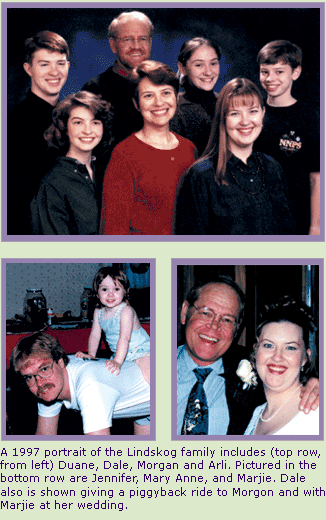
|
|||||||||
“Dale was a carpenter, but when we got married and came to Atlanta in 1984, we decided his being a stay-at-home dad would be best while I worked,” says Mary Anne. “He was Captain Kangaroo, Mr. Rogers, and then some. He reared the children, was a wonderful cook, and still had time to be a spokesman for his illness.” The Lindskogs had two children together. One child attends high school in Gwinnett County, and the other is a recent high school graduate. Their three older children are grown. In 1986, a kidney transplant gave Dale a new lease on life. “He got a vacation from dialysis and got so much strength and vitality back,” adds Mary Anne. Because Dale wanted to help others, he decided to attend nursing school, first at Georgia State University and then Emory. After graduating in 1994, he began working at Emory Crawford Long Hospital but resigned later that year because of his health. (He had to go back on dialysis while in nursing school at Emory.) Still, Dale persevered by counseling other kidney patients, speaking at research seminars, and serving on the advisory council for Vasca, a dialysis system manufacturer. He died last year on June 28 at Emory Crawford Long, where a newly planted tree grows in his honor. He was 48. “Dale was so compassionate, the most complete person I have ever known,” says Laurie Hersey of Marietta, a 1994 classmate. “He cared about others, and kept on, despite the bad hand that life dealt him.” |
|||||||||
School dedicates nursing skills lab |
|||||||||
Equipped with the latest in simulated patient models and hospital beds, the Evans Center brings faculty and students together in a state-of-the-art learning environment focused on mastering the clinical skills of nursing. It is named for the couple who built an automobile sales 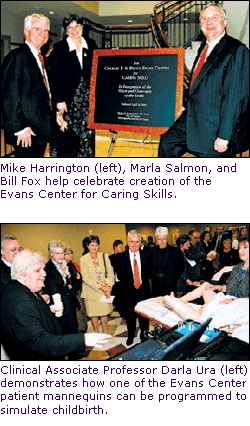 enterprise in the Atlanta area and is funded
with part
of a multi-million-dollar gift from their estate in appreciation for the
medical and nursing care they received at Emory before their deaths. Their
gift also supports projects in the School of Medicine.
enterprise in the Atlanta area and is funded
with part
of a multi-million-dollar gift from their estate in appreciation for the
medical and nursing care they received at Emory before their deaths. Their
gift also supports projects in the School of Medicine.“Because caring is fundamentally about connecting with people in ways that improve their lives, students should arrive at the bedside with strong technical skills already in place,” said Dean Marla Salmon during the dedication. “This allows them to focus on the person who needs their care and to use the skills they have to help them. The Evans Center helps to assure that our students keep the priority of caring for the person in the forefront of their concerns at all times.” Among those present for the dedication were Dr. Bill Fox, Emory senior vice president for institutional advancement, Dr. Steven Kraftchick, associate dean for academic affairs at the Candler School of Theology, and Mike Harrington, one of two Evans estate executors. “Charles Evans was a man of few words,” Harrington told the audience. “When he did speak, it was in superlatives, and I know he would use them if he were here today. This is extraordinary!” Kraftchick reminded listeners of the values that health 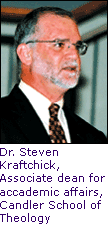 careproviders
hold as the basis for their calling. He relayed, for instance, how a reporter
in Iraq aided a critically wounded soldier by talking to him and squeezing
his hand, as instructed by the field medic. careproviders
hold as the basis for their calling. He relayed, for instance, how a reporter
in Iraq aided a critically wounded soldier by talking to him and squeezing
his hand, as instructed by the field medic.“The medic realized that at the moment the key to that soldier’s life was a human one,” said Kraft-chick. “In the most extreme circumstances, the touch of one human being on another has as much to do with survival as the drugs and the compression bandages that are being used.” In essence, that is what the Evans Center is designed to do—to equip students with excellent clinical skills that enhance the human side of caring for patients. |
|||||||||
TOP |
|||||||||
|
|
current issue . past issues . contact us . from the dean news briefs . milestones . class acts . alumni news Copyright © Emory University, 2004. All Rights Reserved |
||||||||